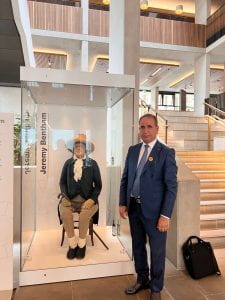Reviving the Local Identity of the City of Basrah
By Zainab, on 25 September 2023
We talk to Dr Hamed H. Samir, Head of Architecture Department, Collage of Engineering, University of Basrah. Dr Hamed held a Nahrein – BISI Visiting Scholarship at University of Loughborough. Dr Hamed’s project is titled Reviving the Local Identity of the City of Basrah and is under the supervision of Dr Sura al-Maiyah.
Tell us about more about your project.

Dr Hamed with “Auto-Icon” of philosopher and reformer, Jeremy Bentham at UCL
Built heritage conservation is essential in post-war areas. In recent years, Iraqi traditional architecture has been deeply affected by several wars, challenging the cultural memory of local people.
My research considers Basra as a pilot case study. Basra is classified as a city rich in cultural heritage. In particular, the canals are a unique feature of the city. Within Iraq, Basra holds the nickname of “Venice of the East”, surrounded by its distinctive architectural identity. Basra today faces urban decay and is losing its architectural heritage and identity in a severe way.
A significant problem is the continuous altering of traditional architecture. The value of Basra’s built environment and its architectural heritage is absent from the local residents. This has contributed to losing countless historical buildings and the unique Basra charm.
The aim of my research is to explore how the legacy of Basra’s past can be transmitted to future generations. My project focuses on digitally documenting the tangible and intangible heritage of Basra. I am hoping to create a digital library to revive the collective memory of residents and to raise awareness regarding the value of Basra’s heritage.
How was your stay in the UK? Did you have promising conversations with colleagues?
It was an amazing experience to be in the UK. I got the chance to meet and work with many colleagues working in similar projects from across the world. In addition, I had the opportunity to visit labs and got experience on the newest cutting-edge tools for heritage documentation.
The colleagues are friendly and very helpful, they were always available to listen and discuss my project and constantly giving feedback. I believe that all this will no doubt lead to developing a solid project and reducing the challenges and barriers.
How will your scholarship help you with your research?
As a researcher, the scholarship in the UK has given me the opportunity to learn the newest technology and tools, such as laser scanning and photogrammetry. In addition, this scholarship has improved my skills regarding the new heritage documenting tools and how to use it. This is very necessary to my project. Moreover, in order to set a plan to create the digital library for Basra city heritage, the interaction with the experts in this field is much required, and this was achieved during my stay in the host university as well as other institutions in UK.

How do you plan to further your research once you are back in Iraq?
The future plan for me after finishing my scholarship and returning to Iraq will focus on creating a digital library for the heritage of Basra city. I believe this library will enhance the knowledge of young architects. In addition, I hope this will raise the awareness of the local people and revive the collective memory of Basra’s heritage and traditional architecture particularly the younger generations.
You can watch Dr Hamed’s seminar titled, Safeguarding the diversity of cultural heritage in Basrah on our YouTube page.
 Close
Close


